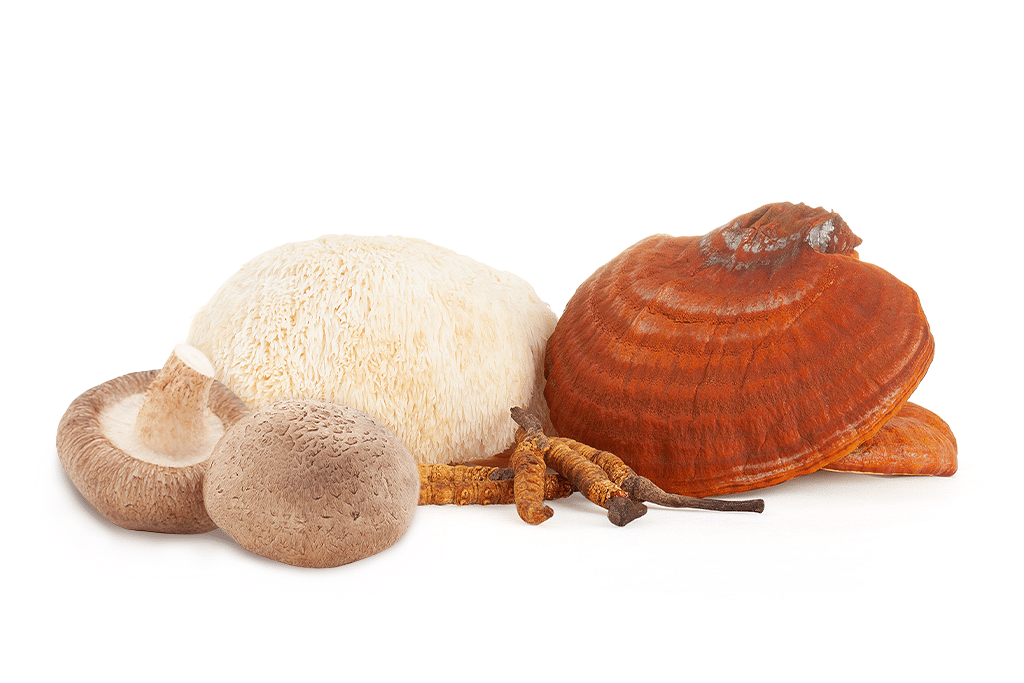
Medicinal mushroom use cases
Medicinal mushrooms are very versatile and can be used in many ways. The valuable minerals, vitamins and other vital ingredients such as polysaccharides found in them are an ideal basis for high-quality dietary supplements for humans and animals alike. In addition, medicinal mushrooms can be added to other foods and even beverages to increase their health benefits.
Some examples of how to use medicinal mushrooms
We’ve listed some popular use cases for medicinal mushrooms below.
- As dietary supplements (capsules, powder, tablets, or even gummy candies)
- In energy, coffee or cocoa drinks
- In ready-made smoothies
- In smoothie powder
- In ground coffee or cocoa powder
- In tea
- In protein powder or bars
- In chocolate
- In cosmetics, such as hand cream or body lotion
- As a supplement for animals such as horses, dogs and cats
This list is not exhaustive, but it should give enough of an idea of the versatility of medicinal mushrooms.


Why use medicinal mushrooms?
The power of mushrooms has been known for centuries, especially in Asia. Medicinal mushrooms have been an important part of Traditional Chinese Medicine (TCM) and are becoming increasingly popular in the Western world as well.
All mushrooms contain essential vitamins and minerals such as vitamin B and C, iron, potassium, magnesium, and zinc. In addition to these, medicinal mushrooms also contain other valuable ingredients specific to these types of mushrooms alone, such as polysaccharides. These are increasingly being studied for their potential health benefits.
Medicinal mushrooms rarely cause allergic reactions and products made from them are bioavailable when properly manufactured.
Offer safe and effective medicinal mushroom products with our raw materials
Which is better, mushroom extract or powder?
Extract or powder, which dosage form should you choose? Well, it depends on how you intend to use the medicinal mushroom raw materials.
Use powder as a preventative and extract more directly
Due to the manufacturing process, medicinal mushroom extract has a higher polysaccharide content than powder. Most vitamins and minerals are lost during the extraction process, but they can be found in powder.
For this reason, medicinal mushroom powder is often used as a preventative dietary supplement in mycotherapy*. The extract is more effective and can thus more directly impact an existing problem.
It’s a good idea to offer both forms if you’re planning to offer medicinal mushrooms as a dietary supplement. Some people may be more comfortable with the less potent powder, while others may need some more boost from the extract.
*An alternative medicine field that focuses on the use of medicinal mushrooms for their healing properties.
Only use extract with liquids
As a rule of thumb, if the medicinal mushroom product is to be mixed with water or other liquids, an extract must be used. The extract is completely soluble in water, so it can be used with cocoa powder, ground coffee or in an energy drink, for example.
Powder, on the other hand, is never completely soluble in water. Therefore, when mixed with water, it may form lumps.
Coarse powder is only suitable as a tea
Coarse mushroom powder or meal is less suitable for use as a dietary supplement because the body can’t easily absorb the ingredients in this form. The finer the powder, the better the human body can use it.
However, medicinal mushroom meal can be used very well for making teas, for example.
What else to consider when using medicinal mushroom raw materials
Mushroom raw materials don’t like moisture
Mushrooms are very water absorbent, which makes mushrooms extracts and powder vulnerable to moist environments. This has a couple of consequences.
High humidity can cause mushroom powder or extract to become lumpy, even if they are in a capsule. Therefore, it is important to have a very waterproof package and to store the raw materials in a dry place.
Furthermore, we don’t recommend the use of mushroom raw materials in foods that require a high temperature to make them, as this releases a lot of moisture. An example of this is the use of mushroom powder in bread dough.
We can’t guarantee as of yet, that the important ingredients of the powder would survive being baked in an oven for a long period. More research into this needs to be done.
Mushroom extract isn’t soluble in oil
Extracts do not dissolve in fats or oils. This should be considered in product development: how will the end product be used by the consumer?

How the features of medicinal mushrooms affect their use in functional foods
The characteristics of certain medicinal mushrooms make them unsuitable for mixing with certain foods.
For example, reishi has a very strong, bitter taste that is difficult to suppress. It doesn’t really work in products that are intended to taste sweet, such as drinks or protein powders. Better alternative would be Cordyceps or lion’s mane. Reishi can be added to ground coffee or dark chocolate instead.
You should also be aware of how different medicinal mushrooms react with the human body. Although the effects can vary somewhat from person to person, there are a few rules to follow.
For example, some medicinal mushrooms like reishi and lion’s mane are used for their calming properties, while others, such as Cordyceps, can rather have a vitalizing and stimulating effect.
This distinction is important if you want to include medicinal mushrooms in an energy drink or to a dietary supplement to help people to sleep better, for example.
If you have additional questions about how to use medicinal mushrooms or want to receive a product sample, don’t hesitate to send us an email or to call us! We are happy to help you further.
